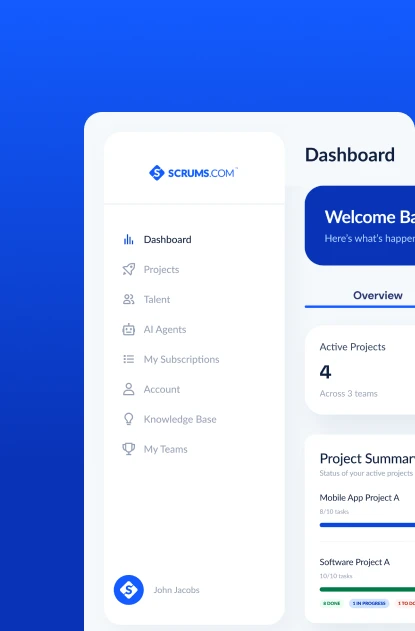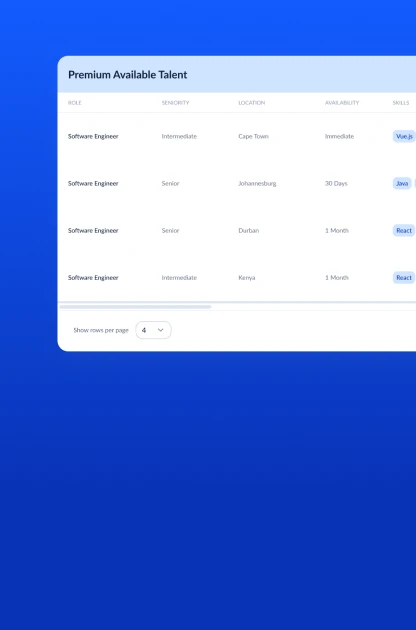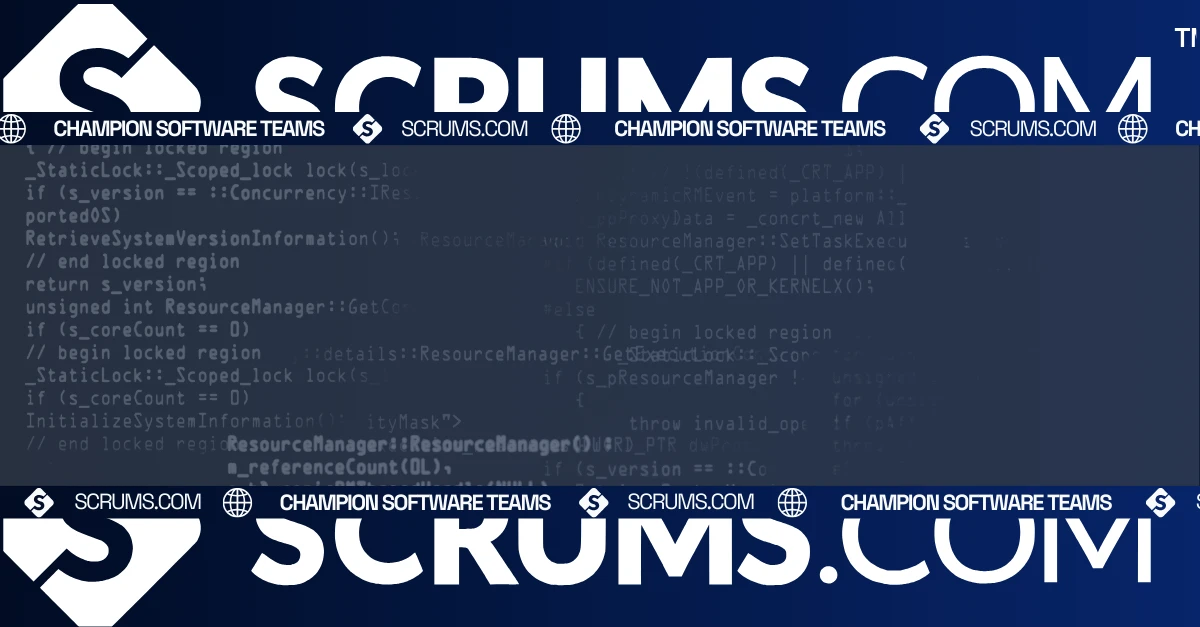Years of Service
Client Renewal Rate
Vetted Developers
Ave. Onboarding
Built for Enterprise Software Development
Whether you're scaling engineering operations, optimizing R&D spend, accelerating feature delivery, or building your first product, our platform and teams adapt to your challenges and goals.

Orchestrate Software Delivery
Unify every stage of software delivery in one platform. AI agents automate busywork. Analytics show you what's working. DevOps pipelines deploy features fast.

Custom Software Services
MVPs that launch. Feature delivery on time. Legacy modernization that stops holding you back, all managed by teams who've done it hundreds of times.

Hire Talent, On-Demand
Forget the hiring nightmare. Discover pre-vetted developers who know your stack, integrate with your tools, and start shipping code in 21 days, not 6 months.
Software Development in Raleigh, NC
Raleigh, North Carolina, has emerged as a major hub for technology and software development in recent years. Known as one of the anchors of the Research Triangle —along with Durham and Chapel Hill—Raleigh offers a fertile environment for innovation, with a strong focus on research, entrepreneurship, and technology. The city's rapid growth, combined with a highly educated workforce graduating from top-tier institutions like North Carolina State University, has enabled it to become a burgeoning hub for technology companies both large and small.
With a low cost of living relative to other tech-heavy regions like Silicon Valley or New York, Raleigh has managed to attract both startups and established tech giants. Companies like Red Hat and Pendo have headquarters here, while major corporations such as SAS Institute are located in nearby Cary. Additionally, according to CompTIA's Tech Town Index , Raleigh ranked 3rd in 2021 for its vibrant job market and technology talent, with over 54,000 tech job postings within the Research Triangle region.
The community is buzzing with tech meetups, hackathons, and collaborative spaces like HQ Raleigh, where developers and entrepreneurs come together to create the next wave of software solutions. For an area that continues to grow at an impressive rate, the demand for custom software development in Raleigh is evident and expanding. Ultimately, Raleigh is transitioning into a premier powerhouse, positioning itself alongside tech hubs like Austin or Seattle.
Why Raleigh Needs Custom Software Development
Raleigh's transition from a Southern college town to a growing tech nucleus is driving the need for custom software solutions across numerous industries. With life sciences, finance, healthcare, and government sectors dominating the region, all of these industries have unique requirements that off-the-shelf software simply can't address. This creates a booming demand for bespoke software products tailored to meet the specific needs of local organizations.
For example, Raleigh's fast-growing life sciences industry, driven by North Carolina’s largest biopharmaceutical cluster, often requires customized software to manage research, development, and regulatory processes. Similarly, with large financial institutions such as First Citizens Bank headquartered in the area, there's a substantial demand for fintech innovations. Custom software can help make sense of vast financial data structures, streamline operations, and meet stringent security requirements.
The city’s growing population—projected to increase by nearly 72% by 2040, according to the Triangle J Council of Governments—also highlights the need for operational efficiency systems, logistics applications, and digital solutions to accommodate urban growth. Custom software is key to that scalability and flexibility, giving Raleigh companies a competitive edge while enhancing user experiences and optimizing productivity across various sectors. In short, Raleigh is not just growing; it's rapidly evolving, and custom software development is critical for charting the course forward.
How Technology is Affecting Raleigh, NC
Technology is having a profound impact on Raleigh's economy, culture, and urban landscape. From transforming industry processes to revitalizing public services, the region is gaining significant advantages through digital transformation. Software solutions are driving innovation in healthcare, ed-tech, and urban planning.
For example, initiatives like Raleigh Civic Technology Action Plan are paving the way for smart city projects, including better public transportation systems, traffic management, and data-driven decision-making in urban policy. Raleigh, with its active Smart Cities initiative, is working on tech-driven urban solutions ranging from smart meters for energy efficiency to real-time data collection on environmental conditions.
However, rapid technological advancement also presents challenges. For instance, while the tech boom has contributed to job creation and economic growth, it has also spurred concerns over housing affordability and gentrification in historically marginalized neighborhoods. These are socio-economic aspects that technology solutions can help mitigate, with the right custom development driving equitable access to employment opportunities and civic engagement platforms.
Moreover, developments in artificial intelligence and automation technologies are already having a dual-edged effect on job markets. Routine tasks in sectors such as manufacturing, logistics, and even legal services are increasingly becoming automated, prompting a reshuffle of employment and skillset demand.
Technology Trends Shaping the Future of Raleigh
Several current technology trends are shaping the future of Raleigh and making it a key player in the broader tech landscape.
- Artificial Intelligence (AI) and Machine Learning (ML) : AI and ML are being actively integrated into custom software development to drive smarter applications in industries like healthcare and finance, which are key to the local economy. From predictive analytics in healthcare to fraud detection in fintech, AI-powered software solutions in Raleigh are transforming business landscapes.
- Internet of Things (IoT) : IoT is becoming instrumental in public spaces as Raleigh’s investments in Smart Cities technologies continue to grow. Why? Because IoT helps optimize traffic flow, energy consumption, and delivers more data-driven public services. Companies building IoT applications are increasingly in demand for custom development solutions tailored to specific urban challenges.
- Cloud Computing : With the city’s emphasis on scalability and business continuity, cloud computing solutions are becoming integral, allowing organizations to access scalable, secure, and cost-effective infrastructures for their operations.
- Edge Computing : As IoT and data-intensive applications expand, the need for edge computing is growing in Raleigh. This trend decentralizes computing power, allowing for real-time data analysis and reduced latency—perfect for areas like telemedicine, autonomous vehicles, and smart grid technology.
What are the Tech Stacks in Raleigh?
In Raleigh, various tech stacks dominate the custom software development scene. Some of the most popular stacks include:
- MERN (MongoDB, Express.js, React, Node.js)
- MEAN (MongoDB, Express.js, Angular, Node.js)
- LAMP (Linux, Apache, MySQL, PHP/Python/Perl)
- Python with Django/Flask for backend web development.
- .NET Core for enterprise solutions, predominantly benefiting finance and healthcare industries.
- Ruby on Rails for quick MVP builds and startup environments.
- Swift/Kotlin for iOS and Android mobile app development.
Locally, JavaScript frameworks (Vue.js and React) and Python are increasingly dominant, with hiring trends favoring these skill sets. Raleigh's tech workforce frequently uses this versatile mix to scale both startups and established enterprises.
The Advantages of These Tech Stacks
These tech stacks lend critical flexibility, scalability, and reliability that support Raleigh’s rapid expansion:
- MERN/MEAN : The JavaScript-based stacks are highly sought for their consistency across front-end and back-end operations. Working within a single language allows faster development and improved maintainability, which is critical for startups in Raleigh looking to minimize time-to-market.
- LAMP : This open-source stack is highly customizable and cost-effective, making it a favorite among small to medium enterprises, especially in Raleigh’s growing startup ecosystem.
- Python (Django/Flask) : Python’s data-handling capabilities make it indispensable for Raleigh’s research-heavy institutions, from life sciences to academic research.
- .NET Core : The scalability and enterprise-grade security of this stack make it perfect for Raleigh’s financial and government sectors.
Industries Benefiting from Custom Software Development in Raleigh
The industries in Raleigh that are most poised to benefit from custom software development include:
- Life Sciences & Pharmaceuticals : Custom software is helping biotech firms manage research, compliance, and drug development cycles more efficiently.
- Financial Technology : Fintech companies are leveraging custom software for better fraud detection, compliance management, and customer personalization.
- Healthcare : With institutions like WakeMed, the demand is high for telehealth platforms, patient management software, and AI-driven healthcare diagnostics.
- Education Technology : North Carolina State University and other institutions require learning management systems, as well as research software tailored to academic needs.
- Public Sector : Custom software is used in civic programs to optimize resource management and streamline public services.
Service Offerings by Scrums.com
Scrums.com offers a comprehensive range of software development services tailored to meet the diverse needs of businesses in Raleigh:
- Custom Software Development
- Mobile App Development
- Web Development
- Cloud Solutions
- AI and Machine Learning
- Software Developer Analytics
- Staff Augmentation Services
- Software Maintenance and Support
Partner with Scrums.com to tap into local market knowledge and global expertise.
Don't Just Take Our Word for It
Hear from some of our amazing customers who are building with Scrums.com Teams.
Find Related Software Development Company Locations
How to Hire Scrums.com for Custom Software Development
Align
Let us get to know your business. Book a free consultation and tell us about your requirements and software development project details.
About Us
We will discuss Scrums.com, our processes and how our our hiring process and subscriptions work.
Next Steps
We will discuss Scrums.com's custom development solutions and how we can best solve your current business problem.
Kick-Off
Once we have agreed on the best way forward, we will start the contract closure process. Once that's done - We can kick-off!
Explore Software Development Blogs
The most recent trends and insights to expand your software development knowledge.





























